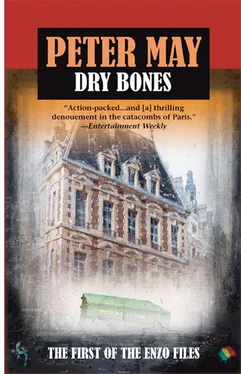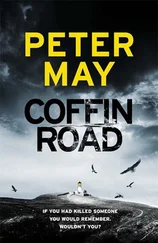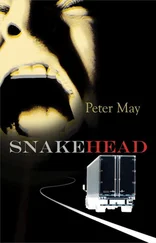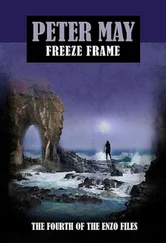‘I never doubted it.’
‘We’re still waiting for the pathologist’s report.’
‘Which probably won’t tell you much,’ Enzo said. ‘Except that those chips and grooves on the bones of the forearms were probably made when he raised his arms to protect himself from the blades of his attackers.’
‘Plural?’ said the judge. ‘What makes you think there were more than one?’
‘There was a lot of damage to the radius and the ulna on both arms. Either the attack was very frenzied, or there were more than one attacker.’
Marie Aucoin looked thoughtful. ‘Why do you think the killer — or killers — left clues leading to the next body part?’
‘It’s strange, isn’t it?’ said the judge, before Enzo could answer. He was clearly intrigued. ‘It’s almost as if finding one body part will lead inexorably to the others.’
‘If you can decode the clues,’ Enzo said. ‘But it’s clear that the pieces we have recovered so far were never meant to be found.’
‘Which somewhat undermines your theory, Jean-Pierre,’ the Minister said. She glanced at the judge and then folded her hands on the table in front of her, fixing Enzo with dark blue eyes. But there was very little warmth in them now. ‘Monsieur Macleod, I want to thank you on behalf of both the government and the police for the work you have done in bringing Jacques Gaillard’s murder to light. You have performed a very valuable service, and I will be making our gratitude public at a press conference tomorrow.’ She paused.
‘But?’
‘Now that the circumstances of his killing have been brought to our attention, I have appointed a special investigation team to look into it. The team will be led by Juge Lelong.’ Enzo glanced at the judge, who was watching him impassively. ‘Which means that your help will no longer be required.’
‘In fact,’ said Juge Lelong, ‘were you to involve yourself in further investigations, it might be regarded as interference in official police business.’
‘Although, of course, given your familiarity with the background of the case, any further insights that you might have would be gratefully received,’ Marie Aucoin added quickly, and she smiled sweetly across the table. A long silence hung in the soft light of the red lantern. ‘Well?’
‘Well what?’
The judge stressed each individual word. ‘Do you have any further insights?’
‘No.’ Enzo realised that Raffin’s words of warning had, indeed, been prophetic.
‘Good.’ Marie Aucoin sat back smiling, business accomplished. She lifted a little bell from the table and tinkled it. ‘Time for coffee, I think.’
Enzo sat in the back of the taxi and pulled off his tie. He stuffed it in a pocket and opened the top two buttons of his shirt. He took a deep breath. It was late. Nearly midnight. The air was still hot, heavy with humidity and pollution, and night had settled on the city like a warm, damp blanket. Streetlights drifted past, streaking darkness, like disembodied beings from another world. Enzo’s own world felt very small, confined to the space he occupied in his taxi. A world filled with confusion, anger, frustration. He was damned if he was going to give up his investigation just to save the further blushes of the government and the police. They had failed to make any progress in ten years. What guarantee was there that they would make any now? Perhaps they were hoping that Gaillard would simply go away again. And, yet, he knew how difficult it would be for him to proceed if the authorities were against him. Interfering with official police business . Juge Lelong’s words rattled around in his head. The warning could not have been clearer.
They crossed the river at the Pont de la Concorde. The Boulevard St. Germain was deserted at its eastern end. Enzo stared out bleakly at the empty pavements, shuttered shops, and darkened apartments. As they passed the junction with the Boulevard Raspail, he could see the lights of the sixth arrondissement ahead of them. The cafés would still be full, and only now would late-night diners be debouching from bars and brasseries. He could almost hear the narrow streets around his studio echoing with their laughter, and he was not sure that he could face it. On an impulse he told the driver to take him to the ële St. Louis instead, and he got out in the Rue des Deux Ponts.
The street was quiet as he watched the taxi recede into the night. The café on the corner where he had sat watching for Kirsty just a few days earlier was closed. They were sweeping out in the restaurant where he had eaten lunch. He stood on the pavement and wondered what he was doing here. He walked to a point opposite the entrance to her apartment. The buildings on this side had been recently renovated. There was a For Sale sign outside the first floor apartment above him. He craned his head up towards the attic studios opposite and wondered if Kirsty’s place looked down into the street. There were lights on in a few windows. Was one of them hers? Did she ever think about him, except in anger? His own father had died when he was a young man, so he knew what it was to be fatherless.
Why had he come here, drawn back like a moth to the flame? Guilt? The realisation that, in truth, he had given Kirsty every reason to hate him? He knew, after all, that his own pain was self-inflicted. He sighed. This was stupid. He thrust his hands in his pockets and turned towards the Rue St. Louis en l’ële. It would take less than fifteen minutes to walk back to his studio. A taxi passed on the other side of the street and pulled up outside the door to Kirsty’s apartment. A young couple stepped out and the taxi remained idling at the kerb. The girl had long, chestnut hair drawn back in a loose knot, and he heard her laugh, a familiar sound to him, even after all these years. He drew back into a doorway and watched as the young man cupped her face in his hands, talking to her earnestly for some moments, before drawing her face to his and kissing her. They embraced, then, and kissed once more. A long, lingering kiss. Enzo watched, with an ache in his chest and a knot in his stomach. When they broke apart, the young man said something and they both laughed. She was happy, and Enzo would have given anything to be able to share in that happiness. Her young man climbed back into his taxi, and she stood waving as it headed off towards the Pont de la Tournelle. She glanced back along the street, and Enzo pulled further into the shadows. For a moment he thought she had seen him, but then she turned and punched in her entry code and was swallowed up by the building.
He stood in the dark for ten, maybe fifteen, minutes. After all the misery with which he had tainted her life, she was still capable of laughter, and happiness. He had no right to make her unhappy again. He was just being selfish, in search of forgiveness to exorcise the guilt which had haunted him all these years. It was the same selfishness which had prompted him to leave in the first place. To steal away the father she had loved. Nor all thy piety nor wit shall lure it back to cancel half a line, nor all your tears wash out a word of it.
He made a decision, standing in the doorway, her laughter still echoing distantly in his memory, that he would never bother her again. She didn’t want him. It was her choice to make. And he had no right to try to change her mind. He had had his chance once and failed her. The least he could do now was let her get on with her life, free of him, free of the past. A past that he, too, must put behind him, and move on.
He stepped out of the shadows and crossed the street, turning left into the Rue St. Louis en l’ële. The lights of shop windows fell out across the street. Patches of shadow where apartment buildings and doorways stood in darkness were like missing teeth. It was oddly quiet here in the heart of the city, the calm at the centre of a storm. The traffic was a distant rumble. There was no one else in the street. At the far end, the Brasserie St. Louis was shut, tables and chairs stacked up on the pavement under its awning. He heard his own footsteps echoing back from the apartment blocks rising on either side, each step laden with resignation.
Читать дальше












